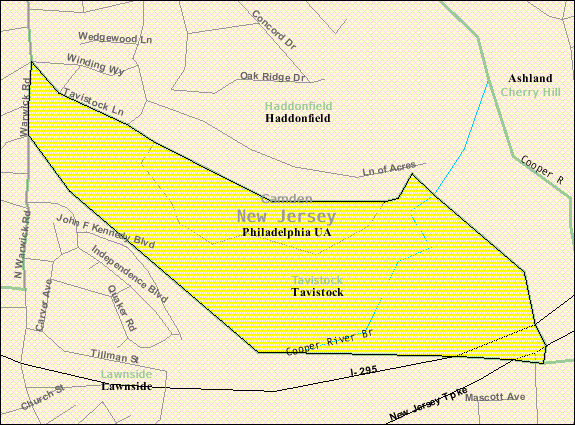Fore For Five
The term “blue law” references a type of ordinance which was (most often) enacted in colonial America, aiming to enforce a religious-based set of morals. They were historically more common in the Northeast and we still see many on the books and, to some degree, enforced even in recent times. For example, until 2012, Connecticut barred retail sales of alcohol on Sundays, and it’s not uncommon to see other restrictions on alcohol sales in various parts of the region. Like any other law, though, especially ones whose rationale no longer jibes with modern social mores, people find loopholes.
In one case, the loophole was about 0.3 square miles large.
Tavistock, New Jersey — the area outlined on the map above — was that loophole. The quarter-of-a-square-mile town located about 15 miles from Philadelphia, per the 2010 census, is home to two families (2.001, officially, for some reason) and a total of five people. It was founded on February 16, 1921 and neighbors the much larger town of Haddonfield, population 11,000 and change.
Haddonfield was governed by a series of blue laws; for example, it was one of the “dry towns” in New Jersey where alcohol sales are prohibited entirely. But in 1921, that wasn’t all that strange. The United States was in the midst of Prohibition, and legal alcohol was nearly impossible to come by; in effect, all towns were dry towns. Haddonfield, though, took legislating morality a step further. Certain recreational activities were disallowed on Sunday, being the sabbath for most everyone in the area. One of those barred activities was golf.
A group of members from the Haddonfield Country Club — the town’s major (and perhaps only) golf course at the time — decided they didn’t like this rule so much, so they pooled some money and started their own club, called the Tavistock Country Club. The members of the new club approached Haddonfield Country Club’s ban on Sunday golfing as a club rule, not a town ordinance, but soon found out the error of their ways. Because the Tavistock club was still within Haddonfield, the same rules applied: there was to be no golfing at Tavistock on Sundays.
So the new country club left Haddonfield. The 18-hole golf course — which constitutes more than 90% of the land area of the current town of Tavistock — seceded from the only town it ever knew and formed its own town, one where golfing on Sunday was perfectly OK.
The new town began with a population of a dozen or two people. Over the years, the town has become even smaller. It is now the state’s smallest municipality by population (although amazingly, not by area), unless one includes the many number of visitors who can come and grab a drink at the clubhouse. While one can probably now play golf on Sunday in Haddonfield, one cannot buy a drink there — Haddonfield, nearly a century after Tavistock’s split and the end of Prohibition, remains a dry town.
Bonus Fact: Golf is cool, but mini-golf may be even better. Where did it come from, though? The game’s origins are unclear, but there’s a good chance that it started as a loophole — one which allowed women to take to the tees Mental Floss explains: the world’s oldest mini-golf course, which started as a ladies-only club, was the “result of the conventions of the day that decreed it improper for a lady to ‘take the club back past their shoulder.'”
From the Archives: The Game Must Go On: Even in war, people golf.
Related: This sticker.

